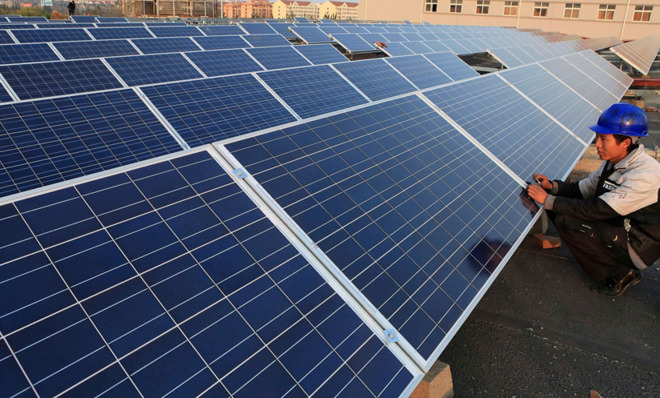The U.S. just made a huge mistake in its solar panel fight with China
This is the wrong trade war at the wrong time

A free daily email with the biggest news stories of the day – and the best features from TheWeek.com
You are now subscribed
Your newsletter sign-up was successful
On Tuesday, the U.S. Department of Commerce announced that an internal investigation had concluded that solar panel components imported from China were being subsidized so heavily that American competitors are being damaged.
The Commerce Department has now hiked import tariffs on solar cells to between 18.56 percent and 35.21 percent depending on the manufacturer, and expanded them to cover fully assembled solar panels. The original round of tariffs on Chinese solar imports introduced in March 2012 initially covered only solar cells.
The new tariffs also cover panels made with parts from Taiwan. Chinese manufacturers had largely sidestepped the 2012 tariffs by manufacturing in Taiwan.
The Week
Escape your echo chamber. Get the facts behind the news, plus analysis from multiple perspectives.

Sign up for The Week's Free Newsletters
From our morning news briefing to a weekly Good News Newsletter, get the best of The Week delivered directly to your inbox.
From our morning news briefing to a weekly Good News Newsletter, get the best of The Week delivered directly to your inbox.
China's Ministry of Commerce accused the U.S. of having "ignored the facts," adding that the sanctions "would not solve the development problems of the U.S. solar industry."
I think that China is right on both counts, and that this is a terribly shortsighted decision.
Now, obviously, having the Chinese government subsidize Chinese solar manufacturers makes it harder for American manufacturers to compete with their Chinese rivals. The more the Chinese government pays their manufacturers, the lower they will be able to push prices.
But solar energy isn't any old product. It is, as I often argue — as does the U.N.'s Intergovernmental Panel on Climate Change — our best hope of preventing dangerous climatic changes:
A free daily email with the biggest news stories of the day – and the best features from TheWeek.com
The new IPCC report warns that carbon emissions have soared in the last decade and are now growing at almost double the previous rate. But its comprehensive analysis found rapid action can still limit global warming to 2°C, the internationally agreed safe limit, if low-carbon energy triples or quadruples by 2050. [The Guardian]
The answer? According to the IPCC, renewable energy, including solar power:
Catastrophic climate change can be averted without sacrificing living standards according to a U.N. report, which concludes that the transformation required to a world of clean energy is eminently affordable. "It doesn't cost the world to save the planet," said economist Professor Ottmar Edenhofer, who led the [IPCC] team. [The Guardian]
Has the Commerce Department considered the possibility that the Chinese government is not subsidizing solar energy to screw U.S. manufacturers, but out of a desire to switch to cleaner energy? Has it occurred to the U.S. government that these Chinese subsidies also subsidize the cost of the American consumers switching to renewable energy, which would be beneficial to the environment?
And finally, has it occurred to the Commerce Department that there is a far simpler way to achieve a level playing field between Chinese and American solar manufacturers? Rather than jack up the cost of Chinese solar components to the levels charged by U.S. manufacturers, the U.S. government could instead subsidize U.S. manufacturers the way the Chinese government does.
Matching Chinese subsidies would mean lower costs for the consumer, and a faster transition to renewable energy. Although solar is already on course to match fossil fuels on price in the next few years — even Big Oil admits that by the end of the century solar will be the number one energy source — raising prices with tariffs now is going to slow that process.
On a global scale, fossil fuels still receive 10 times the total level of government subsidies that renewable energy enjoys. And even though renewables have some inherent economic advantages — not least the fact that they’re renewable, whereas fossil fuels are finite and therefore becoming harder and costlier to extract — slapping tariffs on solar panels will make it even more difficult for solar to become cost-competitive with fossil fuels in the U.S.
This is just a horrible decision that needlessly increases the risk of dangerous climate change.
John Aziz is the economics and business correspondent at TheWeek.com. He is also an associate editor at Pieria.co.uk. Previously his work has appeared on Business Insider, Zero Hedge, and Noahpinion.
-
 The best music tours to book in 2026
The best music tours to book in 2026The Week Recommends Must-see live shows to catch this year from Lily Allen to Florence + The Machine
-
 Gisèle Pelicot’s ‘extraordinarily courageous’ memoir is a ‘compelling’ read
Gisèle Pelicot’s ‘extraordinarily courageous’ memoir is a ‘compelling’ readIn the Spotlight A Hymn to Life is a ‘riveting’ account of Pelicot’s ordeal and a ‘rousing feminist manifesto’
-
 The EU’s war on fast fashion
The EU’s war on fast fashionIn the Spotlight Bloc launches investigation into Shein over sale of weapons and ‘childlike’ sex dolls, alongside efforts to tax e-commerce giants and combat textile waste